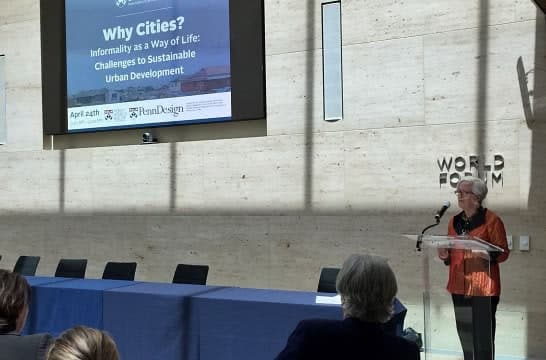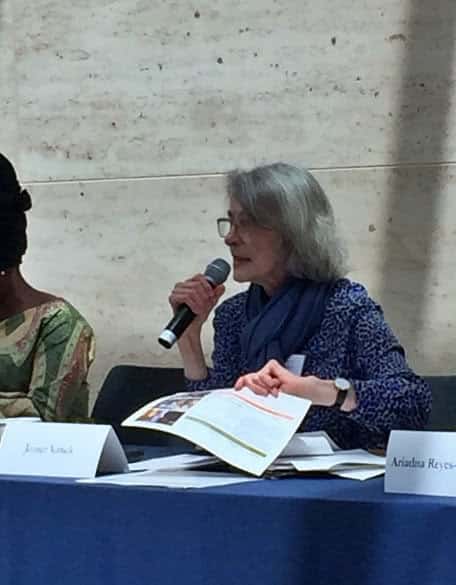University of Pennsylvania Round-table
Philadelphia, PA, USA

According to the United Nations Population Division, "More than one half of the world population lives now in urban areas, and virtually all countries of the world are becoming increasingly urbanized."
In the global South, the past decade has seen unprecedented growth in both population and the pace of urbanization.
The Penn Institute for Urban Research (PennIUR) and Perry World House, two globally renowned research centres at the University of Pennsylvania (UPenn), organized a Round-table on Urban Informality entitled “Informality as a Way of Life: Challenges to Sustainable Urban Development” at Perry World House in April 2019.
The event examined interpretations of informality and how they are shaping efforts to pursue the sustainable urban development agenda over the next three decades.

It also explored the different methods for measuring urban informality and how decision-makers from the national to the neighborhood level are incorporating informality in their policies and programmes. View Agenda
Results of this roundtable were presented at the UN-Habitat Assembly in Nairobi, Kenya, in May 2019.
WIEGO's Presentations
Joann Vanek, Senior Advisor for Statistics at WIEGO, gave a presentation on data: Where are the Data to Measure Informality? What’s Missing?
WIEGO's Sarah Reed presented on the case of the Memorandum of Understanding (MoU) between the Monrovia City Corporation and FEPTIWUL, a Liberian informal worker organization. The City saw partnership with FEPTIWUL as a means of implementing the city's own vision around city beautification and economic development, which FEPTIWUL had spent many years demonstrating to them via block-level organizing, tax collection, and solid waste management.
Marty Chen, Lecturer in Public Policy, Harvard Kennedy School, Affiliated Professor, Harvard Graduate School of Design, Senior Advisor, WIEGO gave the lunchtime lecture on “Informality as THE Way of Urban Life: Perspectives from the Urban Informal Workforce”.
Marty delivered three key messages:
1. The urban poor build informal settlements and pursue informal livelihoods wherever they can find space – preferable in central locations – in an effort to survive.
2. To reduce urban poverty and inequality, cities need to work for the poor, not just the rich; more specifically, they need to support, not penalize, the informal settlements and livelihoods of the urban poor – rather than bend urban rules and regulations to privilege the rich and powerful.
3. Organizations of the urban poor need collective representative voice in urban governance – a seat at the rule-setting and policy-making table.
Faces of Informality
Marty pointed out that informal settlements and informal livelihoods are the main faces of urban informality:
- 13% of all persons globally – 1 billion people – live in slums or informal settlements
- 61% of all workers globally – 2 billion people – work in the informal economy
However, the significance is much greater when only the urban population in developing countries is considered:
- 30% of the urban population in developing countries live in slums (UN 2014)
- 79% of the urban workforce in developing countries are informally employed (ILO 2018)
Interlinkages and Silos
"Many informal workers live in slums; some also work in slums. Many slum dwellers earn their livelihood in the informal economy," she said, adding "Despite the interlinkages between these two faces of urban informality, they tend to be treated separately – in disciplinary silos: both academic silos and also silos of policy and practice."
Marty outlined several victories at both the global level and the city level, and outlined how alliances are being formed and strengthened, leading to new understandings and paving the way to greater victories. But she also addressed how powerful competing interests and shifts in politics can undo progress.
“Most observers view urban informality as a challenge – a problem. But how we address the challenge depends on how we understand and frame the challenge.... For the urban poor, the biggest challenge is the city – its rules and regulations, its officials – who determine who can do what and where, who can live where.”
Marty also raised another dimension of urban informality that requires more focus: urban informality at the top – the collusion of city governments with big business, mainly real estate developers: to identify or create loopholes in existing rules and regulations to serve the interests of the rich and powerful.
“From the perspective of the urban poor, this collusion is the urban challenge. Why, they ask, are the attempts by the urban poor to secure housing and livelihoods viewed as illegal or criminal while the attempts by the urban rich and powerful to protect their elite neighborhoods – their gilded towers – and to generate ever greater profits get rewarded?
"Informality from above is associated with the state: specifically, the ways in which city governments set the rules of the urban game but also, often in collusion with big business (notably real estate developers), promotes deregulation or legal ambiguity and make exceptions to their own rules, while informality from below is associated with the strategies of the urban poor for dealing with the uncertainties of the policies, rules and practices of cities.
"The urban poor create informal settlements by occupying private land or public space at a particular point in time, or incrementally over time, with the hope of permanent occupation. And they pursue their livelihoods by appropriating available space and resources, often on a daily basis. I have characterized informality at the bottom as 'operating in gaps' and informality at the top as 'bending rules'."
A Call to Action
Marty concluded her talk with a call to action.
“We need to come together to address the real challenge of urban informality: the clash between informality of the elite and informality of the poor and the tendency of cities to privilege the rich and powerful to the detriment of the poor and powerless.
"We need to see cities as sites of contestation between the poor and the rich for public space, public services, public procurement – and for public recognition. And we need to hold cities accountable to being inclusive cities for all – with a mandate to balance and negotiate competing urban interests – rather than privileging the powerful and penalizing the powerless.
"This will require forming alliances and coalitions across the disciplinary silos of urban academics and practitioners. This will require an inter-disciplinary approach to urban informality which highlights the intersection of informal settlements, informal livelihoods, urban poverty and inequality, race/ethnicity and gender. It will require redressing the social and economic injustice of privileging urban informality at the top and penalizing urban informality at the bottom.
"Most importantly, this will require that organizations of the urban poor are represented in urban governance – are invited to have a seat at the table in urban rule-setting and policy-making processes.”
